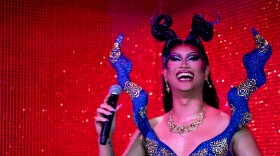Ask some actors about their dream role, and they're likely to offer range of answers: a character from Shakespeare, a superhero, the lead in Phantom of the Opera. As for Daniel Dae Kim, a Korean-American actor who's had roles in Lost, Crash, and most recently Hawaii Five-0, his dream is to play a romantic lead. Any romantic lead.
But Dae Kim said that there's a reluctance on the part of many studio heads to cast Asian-American actors in romantic roles. He said he has asked people in every level of the film industry for data to show that casting white actors is more profitable, and they can't provide any. "It's just this institutionalized thinking," he said. "[They] have it in their minds that it cannot be that way."
Dae Kim joined Arden Cho, Sang H. Cho, and John C. Yang on Wednesday night for a panel discussion hosted by Mnet America and the Congressional Asian Pacific American Caucus on Asian Americans in entertainment. The discussion was led by Traci G. Lee, the digital editorial manager for NBC Asian America. She asked the group about the challenges and opportunities that come with being Asian American in Hollywood today, and how those obstacles connect to broader dynamics that impact Asian Americans.
The panelists touched on familiar frustrations — lack of representation and mentoring; whitewashing of Asian characters; ossified power structures. Arden Cho, of Teen Wolf and YouTube fame, talked about how limited opportunities for Asian American actors affect self-perception.
"I can remember one of the first times I saw an Asian American on TV," Cho said. It was Whitney, a minor character in the 2000 movie Bring It On. Still, the moment was meaningful for Cho. "I was like, oh my God. I could be a cheerleader."
But Cho said that the landscape for Asian-American actors hasn't changed that much in the past 17 years. She gets frustrated by being repeatedly asked to read for secondary characters but never for the leads. She said she asks her agent, "Can I read for A? And he goes, 'No. They're gonna go white on the lead.'"
Cho is looking forward to the day that changes — she said her dream is to play James Bond. "I want to be badass," she said. "I want to be the one that's saving the day. I want to be the hero." In the meantime, she said, she'll continue to make her own opportunities on platforms like YouTube.
Dae Kim, who is currently producing his own show, The Good Doctor, was also excited about carving out space for a more diverse group of actors and stories. He started working on The Good Doctor, he said, because Asian Americans "were waiting for a space that never came." Now that he's producing his own material, Dae Kim said he can "create worlds from the ground up. How I envision them. How I would populate them." But, he said, that also means the shape of the obstacles he faces has changed. He said that when you're a young actor, "you see systemic racism as being out there in the ether." These days, he said, he's looking at it face to face when he works directly with people to produce, write and cast the work he's involved with.
Dae Kim added that despite the obstacles, he thinks Asian-American actors need to be prepared to blow casting directors away. "We like to talk about the ways in which we're overlooked," Dae Kim said. "Our responsibility is to be good at what we do... It's important for us not to ask for charity."
Copyright 2017 NPR. To see more, visit http://www.npr.org/.






